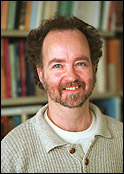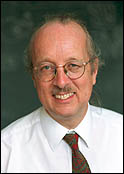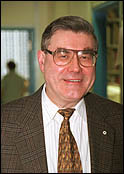At issue
Nobel Peace Prize winner Joseph Rotblat is campaigning for scientists to begin taking a pledge along the lines of the Hippocratic oath and its prescription to doctors to "do no harm." Rotblat worries that scientists don't think enough about the consequences of their work. What do you think?
 PHOTOS: OWEN EGAN
PHOTOS: OWEN EGAN
| |
Professor Charles Gale
Department of Physics
While I agree that scientists should be conscious of their role and should conduct themselves accordingly, I think that a pledge will achieve little if anything.
Society as a whole should be concerned with the promotion of values associated with ethical and responsible work. Science represents humanity's insatiable desire to push back the frontiers of knowledge and thus scientists are but one link of a chain. What is to be done with the knowledge acquired through science is a decision that should involve all of us.

| |
Professor Tim Merrett
School of Computer Science
The harm done through nuclear physics was done by politicians and the military. The harm done now through molecular biology is done by greed.
The issue should be thrown back at those who insist that science pay for itself. Science is wonder, not exploitation. So to these people I ask: do we live to eat or do we eat to live? To Rotblat, I ask: how will resolving to do no harm diminish the harm that may be done by those who exploit your discoveries?

| |
Professor Lawrence Mysak
Department of Atmospheric and Oceanic Sciences
I would be cautious about taking such an oath because it could severely constrain the serendipitous nature of scientific discovery, and also because it is impractical. Discoveries that were never intended to be harmful (e.g., in atomic and nuclear physics) led to the development of the atomic bomb. Conversely, discoveries developed during times of war (e.g., radar) proved to be of great benefit to society today (e.g., for safe navigation).
In my own field, an unexpected but significant development from tritium fallout from hydrogen bomb testing was the detection of deep ocean global-scale currents, which have revolutionized our thinking about the atmosphere-ocean climate system.

| |
Professor Patricia Tonin
Departments of Human Genetics and Medicine
How would a scientist taking a pledge to "do no harm," along the lines of the Hippocratic oath, protect against ill-intended uses of discoveries? Although scientists make the discoveries, it is society as a whole — more so than scientists alone — that determines how they are applied, and harmful uses may not be recognized until long after the initial discovery is made.
As the most patently beneficial or benign discovery can be terribly misused, it is society itself that must ensure that the ways in which these discoveries are used are largely beneficial.

